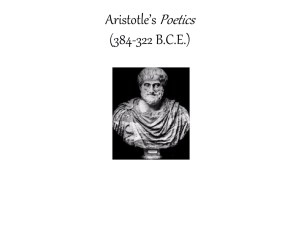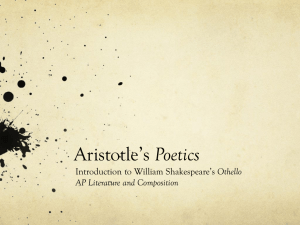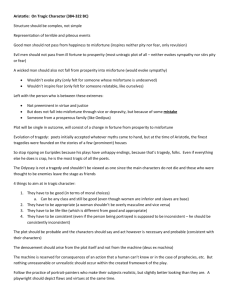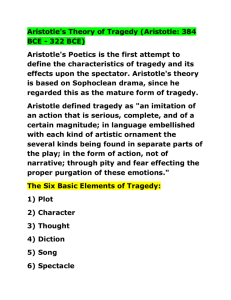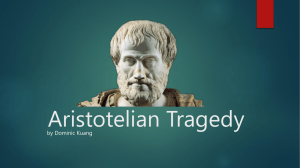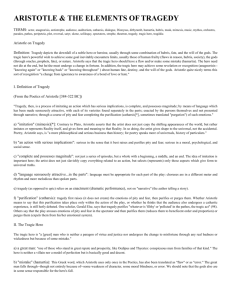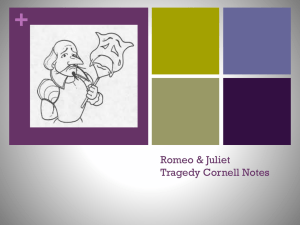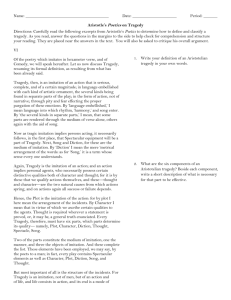Aristotle`s Poetics: Basic Concepts
advertisement
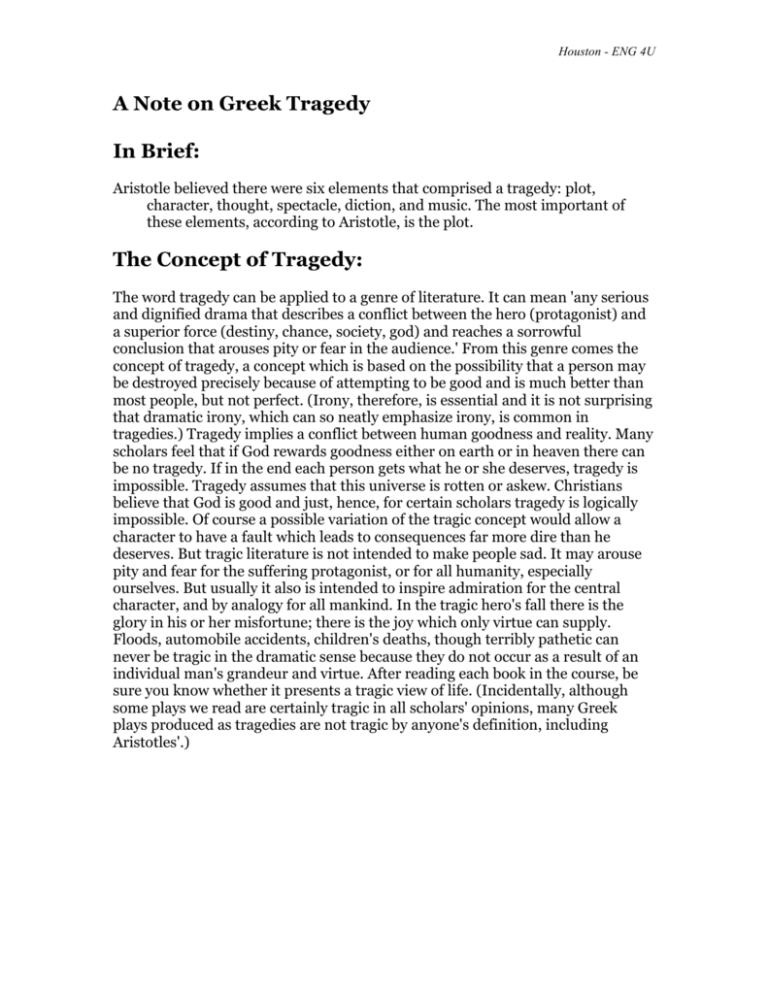
Houston - ENG 4U
A Note on Greek Tragedy
In Brief:
Aristotle believed there were six elements that comprised a tragedy: plot,
character, thought, spectacle, diction, and music. The most important of
these elements, according to Aristotle, is the plot.
The Concept of Tragedy:
The word tragedy can be applied to a genre of literature. It can mean 'any serious
and dignified drama that describes a conflict between the hero (protagonist) and
a superior force (destiny, chance, society, god) and reaches a sorrowful
conclusion that arouses pity or fear in the audience.' From this genre comes the
concept of tragedy, a concept which is based on the possibility that a person may
be destroyed precisely because of attempting to be good and is much better than
most people, but not perfect. (Irony, therefore, is essential and it is not surprising
that dramatic irony, which can so neatly emphasize irony, is common in
tragedies.) Tragedy implies a conflict between human goodness and reality. Many
scholars feel that if God rewards goodness either on earth or in heaven there can
be no tragedy. If in the end each person gets what he or she deserves, tragedy is
impossible. Tragedy assumes that this universe is rotten or askew. Christians
believe that God is good and just, hence, for certain scholars tragedy is logically
impossible. Of course a possible variation of the tragic concept would allow a
character to have a fault which leads to consequences far more dire than he
deserves. But tragic literature is not intended to make people sad. It may arouse
pity and fear for the suffering protagonist, or for all humanity, especially
ourselves. But usually it also is intended to inspire admiration for the central
character, and by analogy for all mankind. In the tragic hero's fall there is the
glory in his or her misfortune; there is the joy which only virtue can supply.
Floods, automobile accidents, children's deaths, though terribly pathetic can
never be tragic in the dramatic sense because they do not occur as a result of an
individual man's grandeur and virtue. After reading each book in the course, be
sure you know whether it presents a tragic view of life. (Incidentally, although
some plays we read are certainly tragic in all scholars' opinions, many Greek
plays produced as tragedies are not tragic by anyone's definition, including
Aristotles'.)
Houston - ENG 4U
Aristotle's Poetics: Basic Concepts
You should be aware of the following concepts and opinions of Aristotle's which
have tremendously influenced drama in the Western World.
a. Tragedies should not be episodic. That is, the episodes in the plot must have a
clearly probable or inevitable connection with each other. This connection is best
when it is believable but unexpected.
b. Complex plots are better than simple plots. Complex plots have recognitions
and reversals. A recognition is a change from ignorance to knowledge, especially
when the new knowledge identifies some unknown relative or dear one whom the
hero should cherish but was about to harm or has just harmed. 'Recognition'
(anagnorisis) is now commonly applied to any self-knowledge the hero gains as
well as to insight to the whole nature or condition of mankind, provided that that
knowledge is associated, as Aristotle said it should be, with the hero's 'reversal of
fortune' (Greek: peripeteia). A reversal is a change of a situation to its opposite.
Consider Oedipus at the beginning and end of Oedipus the King. Also consider in
that play how a man comes to free Oedipus of his fear about his mother, but
actually does the opposite. Recognitions are also supposed to be clearly
connected with all the rest of the action of the plot.
c. Suffering (some fatal or painful action) is also to be included in a tragic plot
which, preferably, should end unhappily.
d. The pity and fear which a tragedy evokes, should come from the events, the
action, not from the mere sight of something on stage.
e. Catharsis ('purification' or 'purgation') of pity and fear was a part of Aristotle's
definition of tragedy. The meaning of this phrase is extremely debatable. Among
the many interpretations possible, consider how well the following apply to our
plays:
1) Purification of the audience's feelings of pity and fear so that in real life we
understand better whether we should feel them.
2) Purgation of our pity and fear so that we can face life with less of these
emotions or more control over them.
3) Purification of the events of the plot, so that the central character's errors or
transgressions become 'cleansed' by his or her recognitions and suffering.
Houston - ENG 4U
Right From the Text:
Poetics Part VI
Of the poetry which imitates in hexameter verse, and of Comedy, we will speak
hereafter. Let us now discuss Tragedy, resuming its formal definition, as resulting
from what has been already said.
Tragedy, then, is an imitation of an action that is serious, complete, and of a
certain magnitude; in language embellished with each kind of artistic ornament,
the several kinds being found in separate parts of the play; in the form of action,
not of narrative; through pity and fear effecting the proper purgation of these
emotions. By 'language embellished,' I mean language into which rhythm,
'harmony' and song enter. By 'the several kinds in separate parts,' I mean, that
some parts are rendered through the medium of verse alone, others again with
the aid of song.
Now as tragic imitation implies persons acting, it necessarily follows in the first
place, that Spectacular equipment will be a part of Tragedy. Next, Song and
Diction, for these are the media of imitation. By 'Diction' I mean the mere
metrical arrangement of the words: as for 'Song,' it is a term whose sense every
one understands.
Again, Tragedy is the imitation of an action; and an action implies personal
agents, who necessarily possess certain distinctive qualities both of character and
thought; for it is by these that we qualify actions themselves, and these- thought
and character- are the two natural causes from which actions spring, and on
actions again all success or failure depends. Hence, the Plot is the imitation of the
action- for by plot I here mean the arrangement of the incidents. By Character I
mean that in virtue of which we ascribe certain qualities to the agents. Thought is
required wherever a statement is proved, or, it may be, a general truth
enunciated. Every Tragedy, therefore, must have six parts, which parts determine
its quality- namely, Plot, Character, Diction, Thought, Spectacle, Song. Two of the
parts constitute the medium of imitation, one the manner, and three the objects
of imitation. And these complete the fist. These elements have been employed, we
may say, by the poets to a man; in fact, every play contains Spectacular elements
as well as Character, Plot, Diction, Song, and Thought.
But most important of all is the structure of the incidents. For Tragedy is an
imitation, not of men, but of an action and of life, and life consists in action, and
its end is a mode of action, not a quality. Now character determines men's
qualities, but it is by their actions that they are happy or the reverse. Dramatic
action, therefore, is not with a view to the representation of character: character
comes in as subsidiary to the actions. Hence the incidents and the plot are the
end of a tragedy; and the end is the chief thing of all. Again, without action there
cannot be a tragedy; there may be without character. The tragedies of most of our
Houston - ENG 4U
modern poets fail in the rendering of character; and of poets in general this is
often true. It is the same in painting; and here lies the difference between Zeuxis
and Polygnotus. Polygnotus delineates character well; the style of Zeuxis is
devoid of ethical quality. Again, if you string together a set of speeches expressive
of character, and well finished in point of diction and thought, you will not
produce the essential tragic effect nearly so well as with a play which, however
deficient in these respects, yet has a plot and artistically constructed incidents.
Besides which, the most powerful elements of emotional interest in TragedyPeripeteia or Reversal of the Situation, and Recognition scenes- are parts of the
plot. A further proof is, that novices in the art attain to finish of diction and
precision of portraiture before they can construct the plot. It is the same with
almost all the early poets.
The plot, then, is the first principle, and, as it were, the soul of a tragedy;
Character holds the second place. A similar fact is seen in painting. The most
beautiful colors, laid on confusedly, will not give as much pleasure as the chalk
outline of a portrait. Thus Tragedy is the imitation of an action, and of the agents
mainly with a view to the action.
Third in order is Thought- that is, the faculty of saying what is possible and
pertinent in given circumstances. In the case of oratory, this is the function of the
political art and of the art of rhetoric: and so indeed the older poets make their
characters speak the language of civic life; the poets of our time, the language of
the rhetoricians. Character is that which reveals moral purpose, showing what
kind of things a man chooses or avoids. Speeches, therefore, which do not make
this manifest, or in which the speaker does not choose or avoid anything
whatever, are not expressive of character. Thought, on the other hand, is found
where something is proved to be or not to be, or a general maxim is enunciated.
Fourth among the elements enumerated comes Diction; by which I mean, as has
been already said, the expression of the meaning in words; and its essence is the
same both in verse and prose.
Of the remaining elements Song holds the chief place among the embellishments
The Spectacle has, indeed, an emotional attraction of its own, but, of all the parts,
it is the least artistic, and connected least with the art of poetry. For the power of
Tragedy, we may be sure, is felt even apart from representation and actors.
Besides, the production of spectacular effects depends more on the art of the
stage machinist than on that of the poet.
